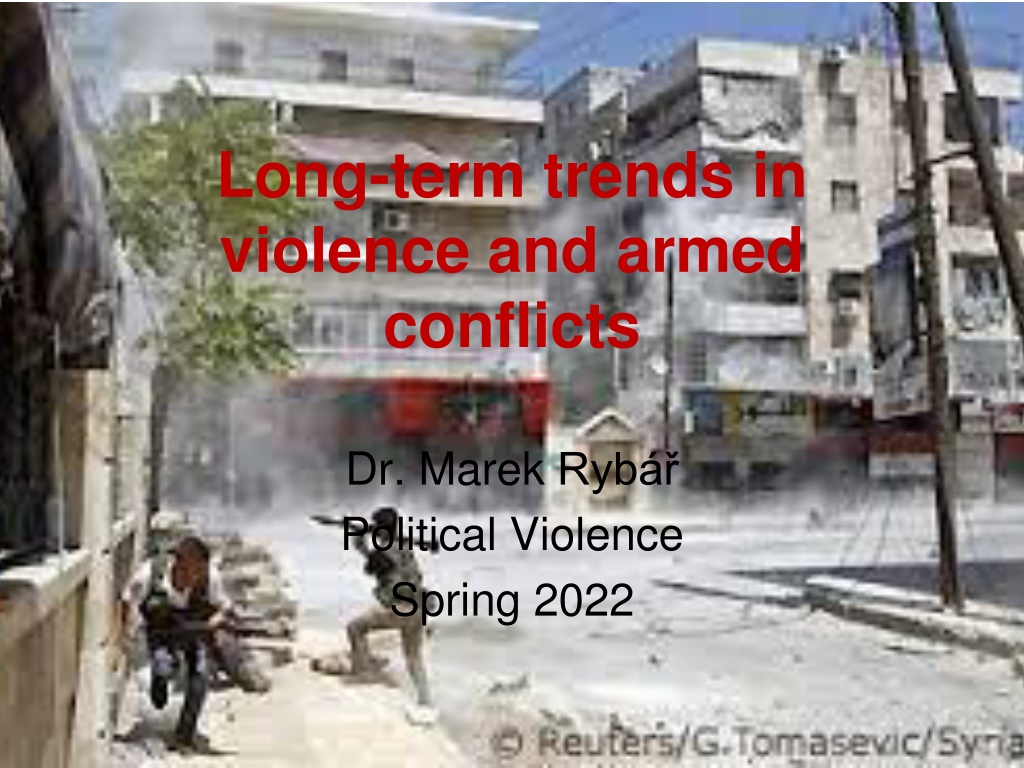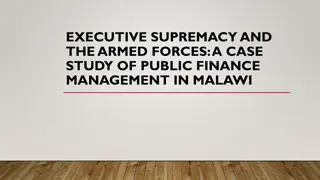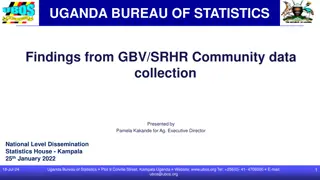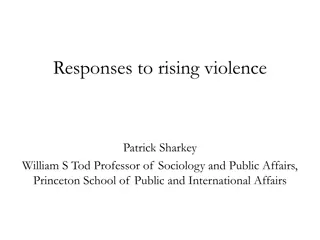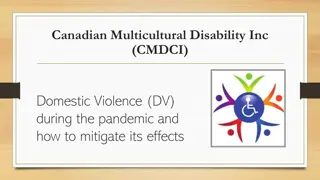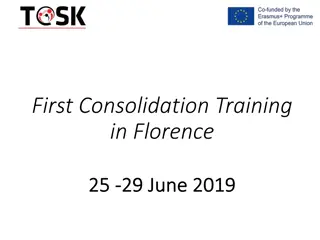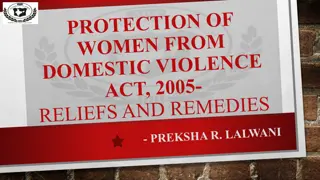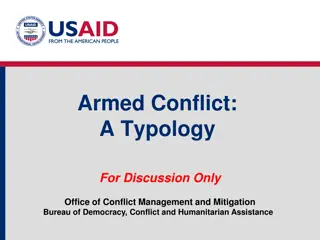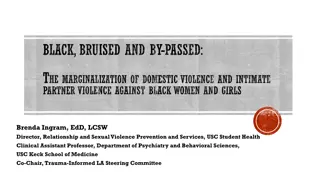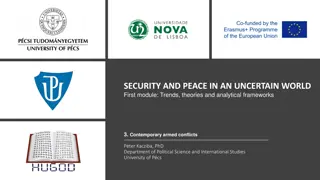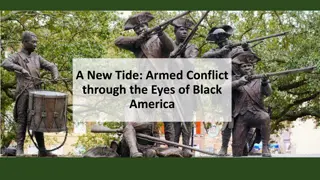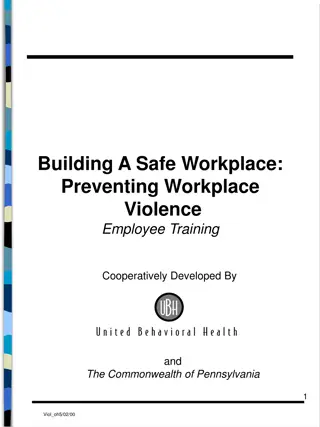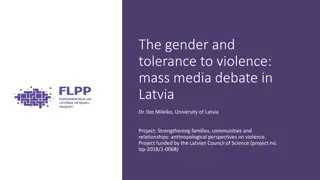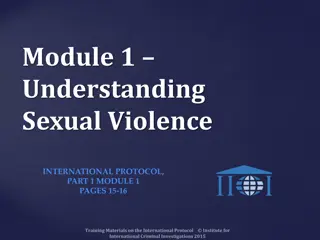Understanding Long-Term Trends in Violence and Armed Conflicts
Explore the profound insights into the nature of violence and armed conflicts through renowned works like 'Leviathan' by Thomas Hobbes. Delve into the causes of quarrels among men, the consequences of living without a common power, and the anarchical nature of international relations as illustrated by 'Lord of the Flies.' Reflect on the pervasive threat of violence depicted by recent global events and consider the concept of unusually peaceful times.
Download Presentation

Please find below an Image/Link to download the presentation.
The content on the website is provided AS IS for your information and personal use only. It may not be sold, licensed, or shared on other websites without obtaining consent from the author. Download presentation by click this link. If you encounter any issues during the download, it is possible that the publisher has removed the file from their server.
E N D
Presentation Transcript
Long-term trends in violence and armed conflicts Dr. Marek Ryb Political Violence Spring 2022
Leviathan Thomas Hobbes (1651) [All men have the equality of ability such that the weak may be able to kill the strong] . . . this equality of ability ariseth equality of hope in the attaining of our ends. And therefore if any two men desire the same thing, which nevertheless they cannot both enjoy, they become enemies
Leviathan (cont.) In the nature of man, we find three principal causes of quarrel: secondly, diffidence (fear), thirdly, glory. The first maketh man invade for gain; the second, for safety; reputation. first, competition; and the third, for
Leviathan (cont.) During the time men live without a common power to keep them all in awe, they are in a condition which is called war. . . . every man against every man. . . . and the life of man [is] solitary, poor, nasty, brutish, and short.
Hobbes Hobbes work is sometimes confused for an apology for absolutism however, it is more appropriate to understand it as a warning: situations in which there is no central authority (the state), i.e. no monopoly for legitimate use of violence, recede to chaos William Golding Lord of the Flies a good illustration is the anarchical nature of international relations: authority able to control the states behavior there is no central
Is violence ubiquitous? a suicide bombing attack in Mogadishu (Somalia) in February 2022 a threat of Russian invasion of Ukraine frozen conflict in Eastern Ukraine civil wars in Ethiopia and Yemen ongoing conflicts in Somalia, Libya, Venezuela and elsewhere the war of Mexican drug cartels Mass killing (200+) in northwestern Nigeria in January 2022 in an ongoing conflict between government and various gangs and militias
Battle deaths in international conflicts per 100.000 inhabitants (Acemoglu 2012)
Is it a statistical fluke? skeptics: human nature has not changed, we all share innate inclination to violence similar innate aggressive tendencies exist among all primates the universality of violence in human societies: homicide, violence, rioting, raiding and feuding rape, domestic
Is it a statistical fluke? furthermore, concludes that, as our species evolved, certain genes, hormones, brain circuits, and selective pressures militated toward violence those pressures could not have gone into reverse within two-three generations since the end of WWII evolutionary psychology
If it is not a trend, how can we explain that human sacrifice was a regular practice in every early civilization and now has vanished? Between the Middle Ages and the 20thcentury, rates of homicide in Europe fell at least 35fold? since the second half of the 18thcentury, every major Western country abolished the use of torture as a form of criminal punishment? European countries used to have hundreds of capital crimes, including trivial offenses, and by mid-20thcentury the death penalty was abolished by every western democracy (except the US)?
If it is not a trend, how can we explain that slavery was once legal everywhere on earth, the last country to outlaw it was Mauritania (1980)? witch hunts, religious persecutions, dueling, blood sports, and debtors prisons were abolished? corporal punishment of children (both paddling and whipping in schools AND smacking in households) in sharp decline in most Western countries and made illegal in several European countries?
Human nature has multiple components 1/4 human violence springs motives, each neurobiological system: 1. exploitation: violence used as the means to an end, damaging a human who is an obstacle to something one wants 2. dominance: the urge to dominate, to become the alpha male; the urge among groups for tribal, ethnic, racial, national or religious supremacy from several different involving
Human nature has multiple components 2/4 3. revenge: the conviction that someone who has committed a moral infraction deserves to be punished 4. ideology: shared spread virally or by indoctrination or force, hold out the prospect for a utopia: since utopia is a world that will be infinitely good, one is permitted to use unlimited amount of force against those who stand in its way belief systems,
Human nature has multiple components 3/4 some of our kinder gentler faculties are pushing against these impulses: 1. self-control: circuitry in the frontal lobes of the brain that can anticipate the long-term consequences of our actions and inhibit them accordingly 2. empathy: the ability to feel someone else s pain
Human nature has multiple components 4/4 3. the moral sense: a system of norms and taboos centered on fairness, loyalty to a community, deference to legitimate authority etc., can motivate the imposition of standards of fairness 4. reason: cognitive processes that allow us to engage in analysis intuitions of objective detached
Contextual nature of the use of violence any combination of the violence-inducing motives may trigger the decision to wage war many human responses are opportunistic, reactive or facultative, elicited by various combinations of environmental triggers and cognitive and emotional states predation and exploitation may occur when an opportunity to exploit a victim at low risk presents itself vengeance to punish (and thus deter) insults or injuries if one lives an orderly bourgeois life free from grave threats or insults, any violent tendencies could lie as dormant
Human Cognition the cognitive apparatus which makes it possible for humans to reason is special in inhibiting humans from the use of violence human cognition can constructs that are capable of preventing violence if the right social infrastructure is there: literacy, open debate, the mobility of people they work by disincentivizing leaders and populations from plunging into war produce social
Social Constructs capable of Preventing Violence limits on government, including in democracy, so that governments do not perpetrate more violence on their people than they prevent an infrastructure of commerce, which makes it cheaper to buy things than to plunder them and which makes other people more valuable alive than dead an international community propagate the norms of nonviolent cooperation intergovernmental organizations encourage commerce, resolve disputes, police infractions and penalize aggression which can which can
Social Constructs capable of Preventing Violence measured responses including economic declarations, tactics of nonviolent resistance, and proportional counterstrikes reconciliation measures such as ceremonies, monuments, truth commissions and formal apologies humanistic counter-ideologies human rights which nationalism, militarism, utopian ideologies aggression, symbolic to sanctions, such as can compete revanchism with and
Criticism there is wide agreement on the decline of war and other forms of violence however, we are between alternative explaining that decline furthermore, even if the trend is accepted, it cannot be extrapolated into the future unable plausible to choose theories
Criticism there may be lack of better angels outside the West, and even the West may be backsliding Pinker may underestimate the importance of the international system and the distribution of power the rise of China is of particular concern a panel of scientist extrapolated from the current trends toward a decline of war too environmental change, esp. climate change (future scarcity conflicts, population migration etc.) in 1912 could have
Criticism democracy democratization associated with violence our evolutionary legacy ensures that the inner demons never go away, they may be triggered in response to threats and actions outside West leaders play a key role: they may be more likely than the average person motivated by inner demons (competition, corruption etc.) may lead to has peace often but process been
The Importance of International System Pinker misses the influence of the system in promoting and (after violence US primacy: during the Cold War, US leadership reduced frictions among many states that were historical antagonists ability to spread democracy and many of the other positive forces identified by Pinker economically liberal worldwide network the growth of the global economy WWII) suppressing
What if War is (sometimes) Rational? Once a power shift has occurred, the states will reach a negotiated settlement. (War is costly.) But if states are experiencing a great power shift, that peaceful settlement may be highly disadvantageous for the declining state. Declining states therefore launch preventive wars if they prefer a costly but advantageous war today to an efficient but disadvantageous peace tomorrow.
How does incomplete information cause war? Incomplete information may lead overly-optimistic states to make too large demands. Rival states that are tougher than expected reject those demands and fight wars. What stops states from resolving the informational discrepancy? Weak states always misrepresent: they bluff to convince the other side to give up more in bargaining. This prevents talk from communicating anything meaningful. have incentives to
Indivisible issues as causes of war? An indivisible issue is something that cannot be adequately divided (who is king of a country or who controls an island, for example). If states cannot effectively bargaining because issues are indivisible, then war can result. However, states can make side payments to resolve the indivisibility and avoid war.
